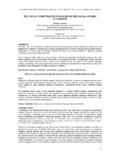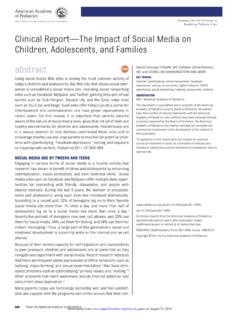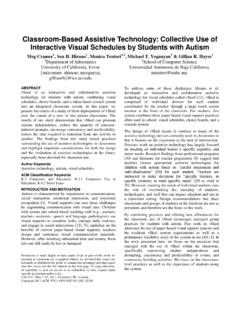Transcription of Social and ethical issues in computer science - …
1 Social and ethical issues incomputer sciencesocial: issues about computers in society Social , political and legalethical:making decisions about what isright Social informaticsRob Kling : .. is the interdisciplinary study of thedesign, uses and consequences ofinformation technologies that takes intoaccount their interaction with institutionaland cultural contexts. What is Social Informatics and Why Does itMatter?,D-Lib Magazine, 5:1, :80/dlib/january99/ technology adouble-edged sword Probably the most significant technologysince the industrial revolution Power has potential to: make routine tasks quick & easy save lives explore space and the world communicate Power has potential problems: loss of privacy theft breakdown of complex systems that werely onWhy is it important that we look at thistechnology from a Social informaticsperspective?3 issues to considerAn example : the ATM Impact on employment Alienation and customer service Crime Privacy Errors and dependabilitySo, are ATM s a good or a baddevelopment?
2 Other issues relevant to this area: intellectual property general Social issues : local community issues class separation; issues of gender, race,disability, the disenfranchised the workplace; homelife education freedoms professional ethics4 What are we weighing up here?It is important to compare computers andtechnology to the real alternativesrather than some idealised situationSome benefits general enhanced experience, includingentertainment, convenience, communications,transport, education, crime fighting; medical devices, patient records,diagnosis, tele-medicine; use of technology by people with disability I/O devices, prostheses, artificial organs science & engineering automation identification systems reduced paper use others .. ?5 Some questions jobs that have been made obsolete bycomputers? jobs that did not exist before computers? benefits and disadvantages of having librarymaterials in electronic format? newspapers? devices or machines that have embeddedmicroprocessors?
3 Systems that are computer -controlled? applications where a computer error could belife-threatening? what is the role of ethics in all of this? others .. ?There is a huge range of topics withinthis area; we only look at some of and workThe way people work has changed: jobs are changing computers are being used in the workplace people are working more flexibly telecommutingAre jobs moving to those primarily insupport of the computer industry?Do jobs require much more computerliteracy than they used to?Income and productivityHow long dopeople work? Working hours have decreased .. or have they? Pay has gone down .. or up .. ? Quality of life .. ?Many of these concerns have also been concernswith the introduction of other work environmentTeleworking:there are variousparadigms, in general working fromoutwith the employer s central premises. benefits to employers .. and employees? problems for employers .. and employees?How can problems be addressed?Consider side effectsUse of computer technology in theworkplace8 Employee monitoring Technology now allows employers tocross the line from monitoring the work tomonitoring the worker CindiaCameronWhy should this be something you even thinkabout?
4 Keystrokes physical surveillance customer service calls e-mail, voicemail, files, Internet accessWhat kind of monitoring do we do at Wits?What is appropriate, what is ethically acceptable?Health issues crt screens RSIThe psychology of email9 Ethics and ComputerScience1. ethics as a field2. the relevance of ethics to computerscienceVarious views on the answer to thequestion what is computer ethics? Maner computers bring new ethical problems Johnson computers just bring a new slant toold problems Moor Social and ethical use of newtechnology Gotterbarn applied ethics for computerprofessionals Think of examples of each of philosophyConcepts of right and wrong behaviour: metaethics where do our ethical principlescome from? metaphysical issues psychological issues linguistic issues normative ethics arrive at moral standardsthat regulate right and wrong conduct deontological theory consquentialist theory applied ethics taking specific controversialissues, use normative ethics (and metaethics)to try to resolve the controversyAssume people arerationaland havefreechoice11 MetaethicsThe origin and meaning of ethicalconceptsMetaphysics the kinds of things thatexist in the universe:are moral values eternal truths or human conventions?
5 Moral realism moral principles have anobjective foundation, not based on subjectivehuman convention eternal law (spirit-like objects) divine commands moral skepticism deny that moral valuesexist objectively (though do not reject moralvalues themselves) moral relativism moral standards aregrounded in Social approval abortion (China vs. Ireland); stealing;killing; suicide; circumcision12 Psychological issuesWhy be moral?Various views: psychological egoism (Hobbes) many ofour actions are prompted by selfish desires psychological hedonism pleasure is thedriving force behing our actions psychological altruism (Butler) someactions come from instinctive benevolenceDavid Hume only emotions canmotivate people to act Kant true moral actionshould be motivated only by Baier moral decision makinginvolves giving the best reasons in supportof one course of action over anotherLawrence Kohlberg followed on thework of Jean Piaget, on the developmentof moral thought and behaviour 1: Kohlberg s stages of moral devel-opmentLevel 1 Level 2 Level 3preconventionalconventionalpostconventi onalStage 1 Stage 2 Stage 1 Stage 2 Stage 1 Stage 2obeyauthor-ity andavoidpunish-mentdifferentsides toanissue;morethanone au-thoritybe agoodpersonbegoodwithinsocietybasicright sanddemo-craticpro-cessesinterestin justprinci-ples6 stages of moral development.
6 Only reachlevel 3, stage 2, in issues what do things like right and good mean? descriptive components cognitive meaning accomplishment oriented components non-cognitive meaningexample:It is good to donate to charity14 Normative ethicsExample: do to others what we wouldwant others to do to us(In contrast, descriptive ethics)Deontological theoriesFrom the Greekdeon= dutyVarious theories within this categorisation: duty theory lists of virtues character traitsthat a person should try to acquire rights theory rights that all people haveand others are obliged to acknowledge natural universal equal inalienable categorical imperatives (Kant) treatpeople as an end and not a means to an end 15 Consequentialist theoriesAn action is morally right if theconsequences of that action are morefavourable than unfavourable: ethical egoism to the agent ethical altruism to everyone but theagent utilitarianism overall favourableDifferent types of utilitarianism: act tally the consequences of eachaction (for each action in eachsituation) rule tally the consequences ofadopting a rule (eg stealing is wrong)16 Applied ethicsSome important distinctions: right, wrong,okay(ethically obligatory,ethically prohibited, neither) negative and positive rights (liberties andclaim-rights) wrong and harm (an act does not have tocause harm to be wrong; just because an actis not ethically wrong does not mean it doesnot cause harm) separate goals from constraints (the goal ofa business is to make profit ethics is to dowithhowthose goals are achieved) personal preference and ethics (eg.)
7 Doingwork for a group that advocates some policythat you personally disapprove of) law and ethics these arenotthe samething! Legal obligation and ethical obligationare also different17 Professional ethicsThe professional is a specialist; the products ofprofessionals affect many rules are not universal, but the tools weuse should include: reason introspection observation of human nature, values andbehaviour an understanding of ethical principlesEthical behaviours within a profession are basedon ethical theoryandwhat is possible usingcurrent technology and what is generally responsibility includes: maintaining a level of competence learning enough to do a good job honouring agreements and contracts madeDo organizations have ethical status? Is it onlyindividuals who should be expected to behaveethically?Professional codes of ethics eg the ACM codeof ethics and professional conduct18An approach for ethical analysis(Baase)1. identify all people and organisationsaffected (stakeholders)2.
8 List all possible actions3. consider impact of each action onstakeholders consequences risks benefits harms costs4. identify responsibilities of decisionmakers & rights of stakeholders5. decide which choices are ethicallywrong, ethically obligatory,acceptable but not required6. if there are several ethicallyacceptable options, consider ethicalmerits of each19An example:You are a computer system manager. An employeeis out sick and another employee requests that youcopy all files from the sick person s computer totheirs so that they can do some do you do?Obvious risk is privacy. Other risk is there mightbe a complaint suit from the employee. If thework that needs to be done (by employee makingrequest), risk of it not being decision depends, in part, on policies andexpectations at particular company. Also onperhaps requiring more call sick employee, but this might not bepossible. Request authorisation from projectmanager, or employee s line actual case, system manager refused to transferall files, but agreed to transfer specific files ifgiven the example: release of work for one of the large credit cardcompanies.
9 Someone asks you to get a copy of aperson s file. He will pay you do you do?Who are the stakeholders?What alternative actions are open to you?Which are ethically prohibited or obligatory?A variant of the scenario:You know another employee sells files withpeople s personal , what do you do?Further example:You are the manager of a university computersystem that provides computer accounts and emailfacilities to students. You discover that a handfulof students have been spamming the entire classand sending junk email to all of the email are unable to find out exactly who thesestudents are as they are using a facility outwiththe university and posting do you do?21 Dependable computingFailure of computer systems can havemany negative effects: death, injury (safety-critical systems) other harm to individuals physical damage direct economic costs indirect economic costs inconvenienceLike other failures, can be caused by avariety of to consider risk of computer system: of using system of not using systemRisk is harm that can be done multiplied by probability that the failure willoccur22In engineering areas, reliability theory iswell developed, but it is difficult to quantify difficult to determine probability ofsoftware failureExamples of problems: individuals billing errors database accuracy errors consumer hardware & software system failures communications business and financial systems destroying business safety critical systems computers in the air air traffic control medical (ex Therac-25)23 Some factors why systems fail.
10 Complexity of systems non-linearity of software not catering for unexpected inputs orcircumstances real world (physical) interaction insufficient testing carelessness pressure to get a product out quickly inadequate attention to potential safety risks data-entry errors inadequate user training overconfidence in software insufficient legal or market incentives24 Another perspective: getting the requirements right validation design & implementation testing & verification models of the world interaction with humans project management skills process used culture of organisation fault-tolerance, backup safety analysis25In summary .. many issues have also been relevantto other technologies perfection is not an option study failures to reduce theiroccurrence balance risks against: other methods benefits obtained26 Privacy2 aspects to this: personal privacy privacy of communications this ismore related to issues of securityPersonal privacy issues are not unique tocomputerisation;Computers are not necessary to the invasion privacyWhat is privacy?








